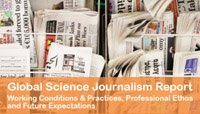 SciDev und die LSE haben gerade den “Global Science Journalism Report“ veröffentlicht. Prof. Dr. Martin Bauer hatte 2009 auf der Weltkonferenz der Journalisten (WCSJ) mit den ersten Interviews begonnen. 953 Journalisten wurden seitdem befragt. Die bislang wohl größte Datenbasis hierzu.
SciDev und die LSE haben gerade den “Global Science Journalism Report“ veröffentlicht. Prof. Dr. Martin Bauer hatte 2009 auf der Weltkonferenz der Journalisten (WCSJ) mit den ersten Interviews begonnen. 953 Journalisten wurden seitdem befragt. Die bislang wohl größte Datenbasis hierzu.
Das Fazit der Autoren:
Science journalists in the developing world are more confident than their counterparts in Europe and North America that science journalism has a buoyant future, according to a global report.
The study into the status of global science journalism was published by SciDev.Net in collaboration with the London School of Economics and Museo da Vida, in Brazil, last week (9 January).
The ‘Global Science Journalism Report’ is based on data gathered since 2009 from 953 science journalists across six world regions: Asia and the Pacific; Europe and Russia; Latin America; Northern Africa and the Middle East; Sub-Saharan and Southern Africa; and the United States and Canada.
It suggests that a perceived crisis in science journalism may be a mainly western phenomenon.
Questions on journalists’ job satisfaction revealed that only 29 per cent of respondents in Europe and Russia and 32 per cent in the United States and Canada agreed that they would “certainly recommend” a career in science journalism to a young student, the report found.
In contrast, 80 per cent of respondents from Northern Africa and the Middle East, 71 per cent from Sub-Saharan and Southern Africa, 61 per cent from Asia and the Pacific and 55 per cent from Latin America said they would do so.
In addition, 66 per cent of all respondents agreed that the tone of science journalism is “not critical enough”.
Yet many science journalists in Asia, and North Africa and the Middle East believe that their work is “too critical” for its own good.
Among all respondents, print remains the most widely used medium, with 90 per cent saying that their work appeared in this format.
However, this was closely followed by web-based stories at 87 per cent and Facebook at 75 per cent.
Furthermore, 55 per cent of respondents reported that their work had appeared in web stories more often over the past five years — the highest figure for any medium.
The use of social media is particularly strong in Northern Africa and the Middle East, the report says, and blogs by scientists are used to support the work of journalists in the developing world far more than in Canada, Europe, Russia, and the United States.
“Ultimately, the success of science journalism will be influenced by the ability of knowledge brokers to disseminate information via the channels that are most effective at reaching the right audiences, whether it is print, online or other types,” says Jessica Romo, one of the authors of the report, and monitoring and evaluation coordinator at SciDev.Net.
“This will be the decisive factor in driving improvements in science journalism over time.”
Dazu die positive Einschätzung des Weltverbands WFSJ:
The Global Science Journalism Report is the most impressive and first ever effort to survey the working conditions, practice and mood of science journalists worldwide.
Its conclusions confirm what the World Federation of Science Journalists has been aware of for several years: the gloom and doom feelings of science journalists in Western countries, but particularly in the United States, is not matched by their colleagues in Asia, in the Arab World, and in Africa.
The Report is both interesting and valuable for its findings – most science journalists still work in print but the web is increasing its impact – but also for its methodology.
Assembling a credible sample of science journalists that represents the worldwide community is a major challenge. The authors of the study make the point that only half of their respondents identify themselves as full-time science journalists. They conclude saying that: “… it remains unclear who the current survey is representative of. The final sample is unlikely to be representative of the world’s science journalists, as we have little information about this group except that it exists”.
At least, the Global Science Journalism Report is a milestone in an eventual better description of this group that might be retreating in some regions but is growing in other parts of the world.

Kommentare (6)